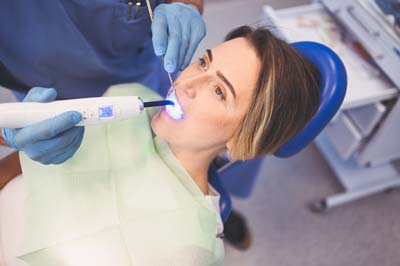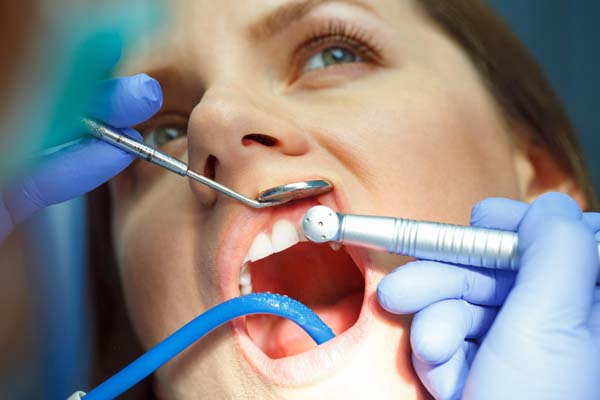What a Dentist Looks for During an Oral Cancer Screening

You should get an oral cancer screening one to two times a year, depending on your risk factors. During the screening, your dentist will ask some questions and then conduct a visual and physical exam. Your dentist will look for signs that indicate oral cancer. Find out what your dentist looks for during the exam.
About the oral cancer screening
Dentists can complete an oral cancer screening in 5-10 minutes. While the screening is short, the process is very thorough. Dentists check for all signs of oral cancer. If any signs are discovered, the dentist and the patient discuss the next steps.
Questions to determine risk factors
The dentist begins the exam by asking questions to determine the patient’s risk of developing oral cancer. If the patient is at risk for oral cancer, the dentist will recommend biannual screenings. Risk factors include using tobacco products, drinking large amounts of alcohol, HPV, prolonged exposure to the sun and a weak immune system. Eating a poor diet and failing to maintain an oral hygiene routine can also increase the risk of developing oral cancer.
Signs of oral cancer
During the visual and physical exam, the dentist will check for symptoms of oral cancer. Common signs include white or red patches located on the lips or in the mouth. The dentist also checks for bleeding sores that do not heal as well as lumps or hard spots. Crusted or roughened areas are also signs that the patient might have oral cancer. Also, the dentist needs to look for masses and nodules in the head, neck, mouth and jawline.
The dentist also looks for pain, tenderness numbness and swelling. Even if the swelling is not painful, it could be a sign that something is wrong. The dentist also checks the bite. Many people who have oral cancer experience changes in the bite. The teeth might not fit together the same way, and the dentist can use X-rays to look for changes.
Diagnosing oral cancer
The dentist does not diagnose oral cancer during the screening. Instead, the dentist looks for suspicious spots or abnormalities. If such a spot is discovered, a biopsy is recommended. The biopsied tissue is sent to a lab for diagnosis. If the biopsy indicates cancer, the patient will need treatment. Those who get regular oral cancer screening are likely to catch the disease in the early stages, which improves the prognosis.
Get screened for oral cancer
Oral cancer can spread if it is not diagnosed and treated. Go to your dentist so you can undergo a screening. Your dentist will begin by asking you questions. Then, your dentist will conduct a visual and physical examination to check for symptoms. If you have suspicious tissue, you will need to get it biopsied to determine if you have oral cancer. Finding oral cancer early can prevent it from spreading to other parts of your body, so schedule regular screenings with your dentist.
Request an appointment here: https://sexton-dental.com or call Sexton Dental at (740) 363-2080 for an appointment in our Delaware office.
Check out what others are saying about our services on Yelp: Read our Yelp reviews.
Recent Posts
Thinking about getting dental sealant treatment? Dental sealants are a vital tool for preventing cavities or tooth decay. Tooth decay is a prevalent condition among children and teenagers, and when unchecked, it can lead to other serious oral issues such as premature tooth loss and gum disease. In combination with other preventive care measures such…
There are a few great dental restoration options for someone needing to repair teeth that are in bad shape. One of the most popular ones is dental fillings, which can be used to restore and renew teeth that are damaged or decayed. Dentists typically recommend fillings for a patient that requires a minor dental restoration…
Dental cleaning is a huge part of routine check-ups. The procedure involves using a scaler to scrape off tartar and plaque deposits from teeth surfaces. Plaque is the sticky film that builds up on teeth, and it hardens into tartar when left on teeth surfaces for a few days. Both make you more vulnerable to…
Most people know about cavities, but what about gum disease? Both of these issues can affect your oral health, but people often overlook gum problems. There are varying levels of severity when it comes to this condition. Even minor bouts with it can cause pain and discomfort. If you do not treat it, you could…


